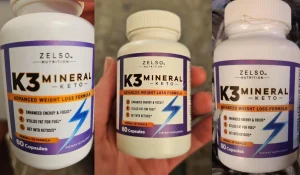Menopause is a natural biological process that marks the end of a woman’s reproductive years. As women approach this phase, usually between the ages of 45 and 55, they experience significant hormonal changes that can lead to various physical and emotional challenges. One of the most common concerns during menopause is weight gain, which can be attributed to a slower metabolism, hormonal fluctuations, and lifestyle factors.
To handle this issue, many experts recommend following the Menopause Diet – a dietary approach specifically designed to help women manage their weight and overall health during this transitional period.
Understanding Menopause And Weight Gain
During menopause, women experience a decline in estrogen levels, which can lead to a redistribution of body fat toward the abdominal area. This hormonal shift also contributes to a slower metabolism, making it easier to gain weight and more challenging to lose it. Additionally, menopausal women may experience changes in appetite, food cravings, and energy levels, which can further exacerbate weight gain.

Gaining excess weight, particularly around the midsection, can increase the risk of various health issues, including cardiovascular disease, type 2 diabetes, and certain types of cancer. Maintaining a healthy weight during menopause is crucial for reducing these risks and alleviating other menopausal symptoms, such as hot flashes, mood swings, and sleep disturbances.
The Basics Of The Menopause Diet
The Menopause Diet is a balanced and nutrient-dense approach to eating that focuses on whole, unprocessed foods. It emphasizes the importance of consuming essential nutrients while promoting sustainable weight loss and overall health. The key principles of the Menopause Diet include:
- Balanced macronutrient intake: Ensuring a balance of lean proteins, healthy fats, and complex carbohydrates from whole food sources.
- Portion control: Practicing mindful eating and adhering to appropriate portion sizes to support weight management.
- Nutrient density: Emphasizing nutrient-dense foods that provide a wide range of vitamins, minerals, and antioxidants.
- Hydration: Drinking plenty of water and consuming hydrating foods to aid in weight loss and overall well-being.
By following the Menopause Diet, women can not only manage their weight but also potentially alleviate other menopausal symptoms and reduce the risk of chronic diseases associated with this life stage.
5-Day Meal Plan And Recipes
To help you get started with the Menopause Diet, we’ve provided a 5-day meal plan with delicious and nutritious recipes. Each day includes three main meals and two snacks, designed to provide a balanced intake of essential nutrients while promoting weight loss and overall health.
Day 1:
- Breakfast: Overnight Oats with Mixed Berries and Walnuts
- Lunch: Grilled Salmon with Roasted Sweet Potatoes and Sauteed Spinach
- Snack: Greek Yogurt with Fresh Fruit and Chia Seeds
- Dinner: Lentil and Vegetable Curry with Brown Rice
Day 2:
- Breakfast: Veggie Frittata with Whole Grain Toast
- Snack: Apple Slices with Almond Butter
- Lunch: Quinoa Salad with Roasted Vegetables, Chickpeas, and Balsamic Vinaigrette
- Snack: Edamame with Sea Salt
- Dinner: Baked Cod with Roasted Brussels Sprouts and Cauliflower Rice
Day 3:
- Breakfast: Avocado Toast on Whole Grain Bread with Sliced Tomatoes
- Snack: Mixed Nuts and Fresh Berries
- Lunch: Tofu and Vegetable Stir-Fry with Brown Rice
- Snack: Cucumber Slices with Hummus
- Dinner: Grilled Portobello Mushroom Caps with Roasted Asparagus and Quinoa
Day 4:
- Breakfast: Green Smoothie Bowl with Spinach, Banana, and Almond Milk
- Snack: Kefir or Greek Yogurt with Fresh Berries
- Lunch: Grilled Chicken Salad with Mixed Greens, Avocado, and Balsamic Vinaigrette
- Snack: Carrot and Celery Sticks with Tzatziki Dip
- Dinner: Baked Cod with Roasted Sweet Potatoes and Sautéed Kale
Day 5:
- Breakfast: Veggie Omelet with Whole Grain Toast Snack: Apple Slices with Almond Butter
- Lunch: Tuna Salad on Mixed Greens with Whole Grain Crackers
- Snack: Cottage Cheese with Fresh Fruit
- Dinner: Grilled Chicken Breast with Roasted Brussels Sprouts and Quinoa
Tips for Long-Term Success
While the 5-day meal plan provides a structured approach to kickstart healthy eating habits and weight loss, long-term success requires a sustainable lifestyle change. Here are some expert tips to help you maintain a healthy weight beyond the 5-day plan:
- Incorporate regular exercise: Engage in a combination of cardiovascular exercise, strength training, and flexibility exercises to boost metabolism, build muscle, and support overall health.
- Practice mindful eating: Pay attention to hunger cues, and portion sizes, and savor each bite to promote a healthier relationship with food.
- Stay hydrated: Drink plenty of water and consume hydrating foods like fruits and vegetables to support digestion and metabolism.
- Manage stress: Engage in stress-reducing activities like yoga, meditation, or deep breathing exercises, as stress can contribute to weight gain and hormonal imbalances.
- Get enough sleep: Aim for 7-9 hours of quality sleep each night, as sleep deprivation can disrupt hormones and increase appetite.
- Seek support: Join a support group or consult with a registered dietitian or healthcare professional to provide guidance and accountability throughout your weight loss journey.
Conclusion
The Menopause Diet is a holistic approach to managing weight and promoting overall well-being during this transitional phase of a woman’s life. By focusing on nutrient-dense, whole foods, practicing portion control, and incorporating regular exercise, women can navigate the challenges of menopause with confidence.
Remember, weight loss and maintenance during menopause is a journey, and consistency, patience, and self-compassion are key. Consult with a healthcare professional or registered dietitian to develop a personalized plan that addresses your unique needs and goals.







